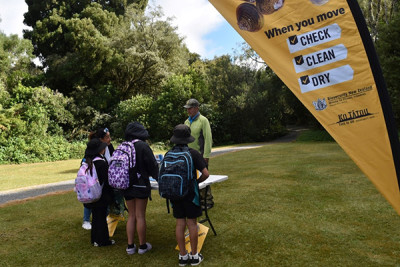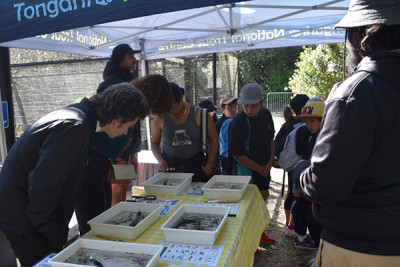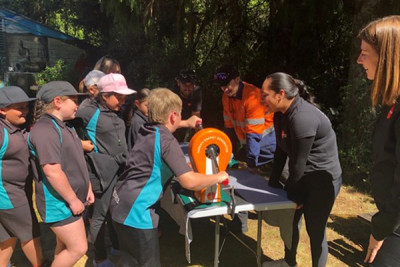“Developing young people's understanding of the many ways wai is vital to the health of our rohe helps our rangatahi cultivate an even deeper appreciation of its value, so the kaitiaki of tomorrow are well placed to give our rivers, lakes and oceans the care they need.”
- Enviroschools Facilitator Jennifer Scothern-King.

The kids were on board with how important the check, clean, dry rules are for boaties
Nestled between the southern shores of Lake Taupō and New Zealand’s oldest national park, the Tongariro National Trout Centre has one of the country’s best collections of native freshwater fish.
In a giant aquarium, kōkopu (cockabullies), tuna (eels) and kōaro swim placidly, kōura (freshwater crayfish) amble by and a turquoise hatchery teems with colourful rainbow trout.
On 21 March and World Water Day, 22 March, around 200 students from five Waikato schools streamed into this awesome location for some fascinating sessions learning about all things water.
Flowing on from the event’s success in 2023, it had to be extended to two days in 2024 to meet demand.

Students found out how to identify macroinvertebrates, which are great indicators of ecosystem health
The occasion was coordinated by Waikato Enviroschools – an environmental education programme where young people are empowered to lead sustainability projects and take action to protect the environment – and well supported by the Taupō Environmental Education Network and representatives from the local water industry.
Enviroschools facilitator and lead event coordinator, Jennifer Scothern-King said: “Protecting clean water and healthy aquatic ecosystems is a key priority for Waikato Regional Council and the Enviroschools programme it supports.
“Developing young people's understanding of the many ways wai is vital to the health of our rohe helps our rangatahi cultivate an even deeper appreciation of its value, so the kaitiaki of tomorrow are well placed to give our rivers, lakes and oceans the care they need.”

Great workout at Genesis Energy demo
Small groups of students excitedly worked their way around a series of 11 interactive stations, covering everything from habitat protection and monitoring to sustainable resource use.
At the Waikato Regional Council stations, they got to sample the new ‘Freshwater Guardians’ education kit. Created by the freshwater biosecurity team at Waikato Regional Council, the full kit consists of a short course of three biosecurity-focused classes. But the taster gave a great overview, using koi carp as an example species.
The rangatahi learnt about the importance of the clean, check, dry rules to stop the spread of freshwater pests from Waikato Regional Council and the Department of Conservation. They also found out about the positive effects of riparian planting and loved getting creative through role play to explain these concepts to their peers.
At the regional council’s flood protection stand, the students were eager to hear how significant swathes of the productive land in our region is made usable by infrastructure like stopbanks and pump stations. Waikato Regional Council Senior Regional Hazards Advisor Phil Mourot demonstrated the relationship between rain events and natural flood plains using a scale model, explaining the need to understand the water cycle to inform careful planning and land use.
A range of other presenters shared their wealth of knowledge too. The students learned about safety on the water and oil spill clean-ups from Lake Taupō Coastguard; hydropower from Genesis Energy; the best plants to have by waterways from community conservation group Kids Greening Taupō; what invertebrate populations tell us about water quality from the National Trout Centre team; how water quality and weather are monitored (using a speedy remote control monitoring boat!) from the National Institute of Water and Atmospheric Research (NIWA); and much more besides.
A highlight for many was getting to experience the National Trout Centre’s impressive aquarium and learn all about native species and why it’s so important to keep pests in check to look after them.
Jennifer said “It was great to see so many different hands-on, high-energy activities in one place. Students continue to be really engaged in learning about the importance of water in the environment”.
It was as clear from their reflections that the students had learned a lot and that the wonderful wildlife on show was a highlight. One student said, “I found it interesting that invertebrates have no spines” while another commented how cool it was “seeing all the fish swimming everywhere”.



To ask for help or report a problem, contact us
Tell us how we can improve the information on this page. (optional)